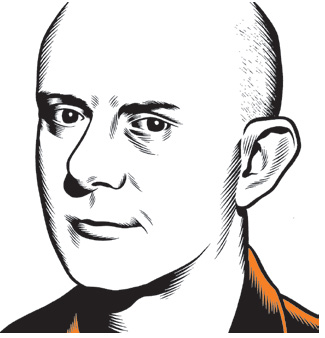BOOKS BOUGHT:1
- The Invisible Woman—Claire Tomalin
- Y: The Last Man Vols 1–3—Vaughan, Guerra, Marzan Jr., Chadwick
- I Never Liked You—Chester Brown
- David Boring—Daniel Clowes
- The Amazing Adventures of The Escapist—Michael Chabon et al
- Safe Area Gorazde—Joe Sacco
- Not Entitled—Frank Kermode
BOOKS READ:
- Train—Pete Dexter
- This Is Serbia Calling—Matthew Collin
- The Invisible Woman—Claire Tomalin
- Y: The Last Man Vols 1–3—Vaughan, Guerra, Marzan Jr., Chadwick
- I Never Liked You—Chester Brown
- David Boring—Daniel Clowes
If you wanted to draw a family tree of everything I read and bought this month—and you never know, it could be fun, if you’re a writer, say, or a student, and there are several large holes in your day—you’d have to put McSweeney’s 13 and Pete Dexter’s novel Train right at the top.2 They’re the Adam and Eve here, or they would be if Adam and Eve had been hermaphrodites, each able to give birth independently of the other. McSweeney’s 13 and Train never actually mated to produce a beautiful synthesis of the two; and nor did any of the other books actually get together, either. So it would be a pretty linear family tree, to be honest: one straight line coming out of McSweeney’s 13, because McSweeney’s begat a bunch of graphic novels (McSweeney’s 13, edited by Chris Ware, is a comics issue, if you’re not from ’round these parts), and another straight line coming out of Train, which leads to a bunch of nonfiction books, for reasons I will come to later. Train didn’t directly beget anything, although it did plant some seeds. (I know what you’re thinking. You’re thinking, Well, if Train and McSweeney’s 13 never actually mated, and if Train never directly begat anything, then how good is this whole family-tree thing? And my answer is, Oh, it’s good. Trust me. I have a writer’s instinct.) Anyway, if you do decide to draw the family tree, the good news is that it’s easy; the bad news is that it’s boring, pointless, and arguably makes no sense. Up to you.
Pete Dexter’s Train was carefully chosen to reintroduce me to the world of fiction, a world I have been frightened of visiting ever since I finished David Copperfield a couple of months back. I’ve read Dexter before—The Paperboy is a terrific novel—and the first couple of chapters of Train are engrossing, complicated,...
You have reached your article limit
Sign up for a digital subscription and continue reading all new issues, plus our entire archives, for just $1.50/month.
Already a subscriber? Sign in






